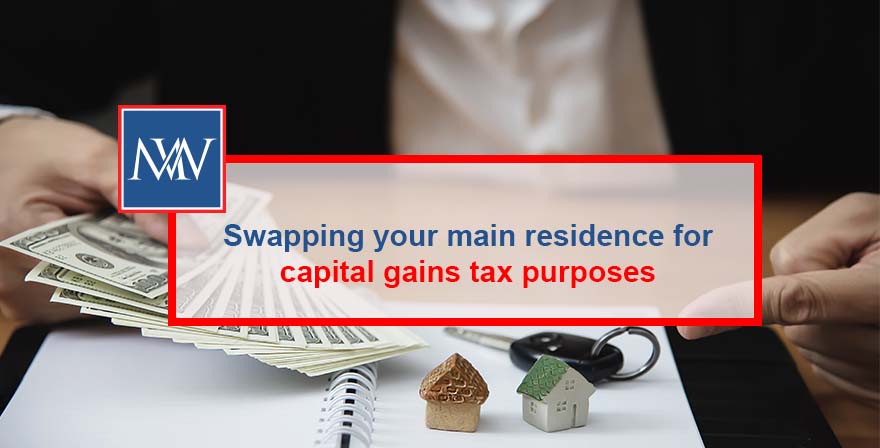
Swapping your main residence for capital gains tax purposes
Private residence relief means that you do not have to pay capital gains tax on any gain that you make when your sell your home to the extent that the gain relates to the period that you lived in the property as your only or main residence or the last nine months of ownership (36 months if you are disabled or sell your home and go into care). For capital gains tax purposes, you can only have one main residence at a time. Married couples and civil partners can only have one main residence between them. If you have more than one home, you will need to decide which property is your main residence for capital gains tax purposes.
Nominating a main residence
A taxpayer can choose which of his or her residences is their main residence for capital gains tax purposes. However, only those properties which are lived in as a residence can be considered for main residence status – properties which are let out are not occupied as a residence and consequently cannot be nominated as the taxpayer’s main residence.
The nomination must be made in writing to HMRC. The letter must state the address of the property which is to be the main residence and must be signed by all the owners of the property. An election must be made within two years of the date on which the mix of residences changes. A new election must be made each time your combination of homes changes if, after the change, you still have at least two homes. Once again, you have two years from the date on which the combination of residences changes to make your election.
In the absence of an election, the issue of which property is the taxpayer’s main residence for capital gains tax purposes is a question of fact – i.e., which property is actually occupied as the ‘main’ residence.
Example
Laura and John have a house in Shrewsbury. In July 2019 Laura started a new job which required her to work in Newcastle four days a week. Laura and John purchased a flat in Newcastle for Laura to live in during the week. Both properties count as ‘residences’ and the couple had until July 2021 to elect which property is their main residence for capital gains tax purposes. An election was made in January 2020 nominating their Shrewsbury house as their main residence.
In June 2022, they moved from Shrewsbury to Bath. They make a new election to nominate the Bath house as their main residence.
Varying the nomination
Once a property has been nominated as a main residence, the nomination can be varied at any time. This allows taxpayers to ‘flip’ their main residence to ensure that they maximise the benefit of private residence relief. The notice of variation can be backdated up to two years from the date on which it was made.
A notice of variation can be effective when a disposal is to be made, or has been made, to access the final period exemption. Having flipped the properties, the nomination can be flipped back to secure the final period exemption without much loss of relief in relation to the other property.
Example
The facts are as in the example above. Laura secures a new job in Bath and plans to sell the Newcastle flat when her current job comes to an end on 31 December 2023. In July 2023 they vary the election to nominate the Newcastle flat as their main residence, backdating the variation to 1 October 2022. They make a further variation in September 2023 to change their main residence back to the Bath house, backdating this to 1 March 2023. This has the effect of making the Newcastle flat the main residence from 1 October 2022 to 28 February 2023. As it has been a main residence at some point, the last nine months of ownership qualifies for main residence relief.
Main residence relief for the Bath house is lost for the period from 1 October 202to 28 February 2023 (unless any of that period falls within the last nine months of ownership). However, any gain pertaining to that period may be covered by Laura and John’s annual exempt amounts.
Need Accountancy Support?
For information on bespoke training, or if you have any other questions for Makesworth Accountant, please fill in your details below
















 151
151